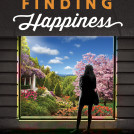|
|
||
|
Pro Tools
FILMFESTIVALS | 24/7 world wide coverageWelcome ! Enjoy the best of both worlds: Film & Festival News, exploring the best of the film festivals community. Launched in 1995, relentlessly connecting films to festivals, documenting and promoting festivals worldwide. Working on an upgrade soon. For collaboration, editorial contributions, or publicity, please send us an email here. User login |
Finding Happiness, Review
Finding Happiness Against a background of economic crisis, climatic catastrophes and the cancer of corruption, journalist Juliet Palmer, of Profiles magazine, is given an unusual assignment, a “..so not me” project that she initially refuses to accept but is coaxed into doing, by her boss at the magazine. It involves visiting a spiritual community in northern California interviewing its visionary founder: Swami Kriyananda and his Ananda World Brotherhood Village. Kriyananda had founded the first village in 1968, and now the community operates in Italy and India too. The story that emerges has its origins in the 1920s, when yoga was first brought to the shores of America, by Paramhansa Yogananda, who became famous as the author of the most-read Autobiography of a Yogi. James Donald Walters, aged 22, became one of his youngest followers and assumed the name of Kriyananda. With the twin credos--that change comes from within and that environment greatly influences our life experiences and spiritual evolution, Kriyananda set to work, and continued to embrace the cause till his death in 2013, aged 87. He did not live to see the exhibition of this film, which was largely his concept. Kriyananda authored 150 books, composed 400 songs and choral and instrumental pieces, and was an accomplished poet, playwright, lecturer, photographer, linguist, TV and radio broadcaster. In 1968, he published the book that brought him renown as the “father of the spiritual community movement,” Co-operative Communities: How to Start Them and Why. Although Finding Happiness is a docu-feature, it has a fiction component in the shape of the magazine and the assignment. The versatile Elisabeth Rohm is cast as Juliet. From running a juicery to appearing in spiritual films and mainstream Hollywood fare (American Hustle), Elisabeth Röhm finds balance through yoga. Her mother was a devotee of Maharishi Mahesh Yogi. Though done with the least amount of fuss, the film's prologue and the magazine feature assignment fail to convince, appearing what they are: a ploy. Elisabeth is good-looking and her style is free-flowing. Yet, her performance is average. David Eby plays the guide who introduces Juliet to Ananda Village. He also served as the film’s music director, and music supervisor for the soundtrack. Very polished and wearing a beatific smile, he floats through the film, making entries and exits as if mechanically programmed, on cue. Kriyananda himself is a strong, gentle presence, oozing love and kindness. He speaks flawless English and comes across as sincere. Writer-Director Ted Nicolaou started with conducting extensive interviews with Swami Kriyananda and members of the Ananda communities in the U.S. and Italy. Ted’s first film was the apocalyptic short Southern Hospitality. After moving from Texas to Los Angeles, he worked as a film editor on a dozen low-budget features. Ted wrote and directed the cult science fiction comedy Terrorvision. He created the atmospheric gothic thriller Subspecies (Paramount Home Video), the first American/Romanian co-production, shot on location in Transylvania. This film has its limitations and maybe he was handicapped by rigid control at the community level. There is little creativity on display. It unfolds like any standard documentary, with some lovely images and gentle souls on screen. There is no mention of the lawsuit that Kriyananda had to face from the Self-Realization Fellowship (SRF), the organisation founded by Yogananda, where Kriyananda was Vice-President for a while. In 1990, SRF had accused Kriyananda of re-publishing material that he wrote while he was with them, and of using Yogananda’s name without permission. By the conclusion of the lawsuit in 2002, Ananda had won over 95% of the copyright case filed by SRF. To the converted, it must be a great film. As an attempt to get converts to the cause, it will have limited success, for, as Elisabeth herself said in an interview, “Everybody cannot live in a community.” To the objective reviewer, it is not a film to rave about, in spite of all good intentions. Released in the USA in February this year, this 96-minute film comes to India in April. Rating: ** Trailer: https://www.youtube.com/watch?v=NCcPDikEVdM 24.04.2014 | Siraj Syed's blog Cat. : Finding Happiness is not easy Hollywood
|
LinksThe Bulletin Board > The Bulletin Board Blog Following News Interview with IFTA Chairman (AFM)
Interview with Cannes Marche du Film Director
Filmfestivals.com dailies live coverage from > Live from India
Useful links for the indies: > Big files transfer
+ SUBSCRIBE to the weekly Newsletter Deals+ Special offers and discounts from filmfestivals.com Selected fun offers
> Bonus Casino
User imagesAbout Siraj Syed Syed Siraj Syed Siraj (Siraj Associates) Siraj Syed is a film-critic since 1970 and a Former President of the Freelance Film Journalists' Combine of India.He is the India Correspondent of FilmFestivals.com and a member of FIPRESCI, the international Federation of Film Critics, Munich, GermanySiraj Syed has contributed over 1,015 articles on cinema, international film festivals, conventions, exhibitions, etc., most recently, at IFFI (Goa), MIFF (Mumbai), MFF/MAMI (Mumbai) and CommunicAsia (Singapore). He often edits film festival daily bulletins.He is also an actor and a dubbing artiste. Further, he has been teaching media, acting and dubbing at over 30 institutes in India and Singapore, since 1984.View my profile Send me a message The EditorUser contributions |




























